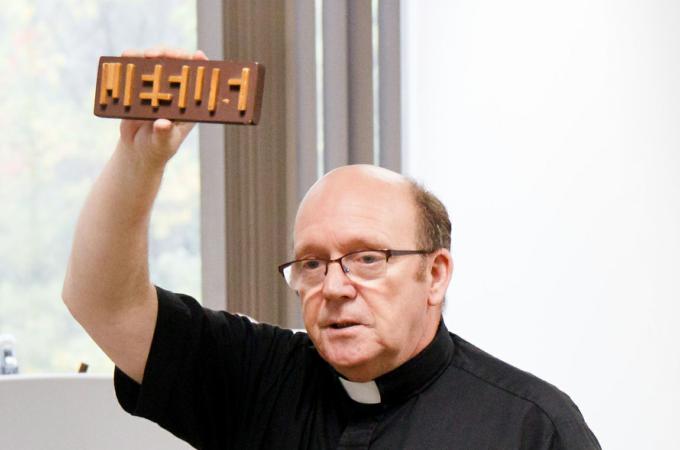Archdiocese hosts addiction recovery workshop
BRAINTREE -- Father Joe White struck a match, and lit a candle. The small flame danced as he put the candle down at the front of the room. As he lit it, he said to the dozens of pastoral staff and clergy gathered at the Pastoral Center for an addiction recovery workshop, Oct. 25, as a way to pray for "those who are suffering."
"We can pray for families, we can pray for loved ones, and we can pray for all of us who have an interest and desire in care and compassion," he said.
Sponsored by the Archdiocese of Boston's Opioid Task Force, the Archdiocesan Addiction Recovery Pastoral Support Services (AARPSS), and the Office of Chaplaincy, the "Bringing Christ into Recovery" workshop offered participants talks on addiction recovery and the opioid epidemic from experts in the fields.
The event began in prayer, led by Father White, head of AARPSS and administrator of St. Joseph Parish in Boston, before he offered brief words of welcome and introduced some of the outside speakers.
Speakers included: Kathryn Power of Substance Abuse and Mental Health Services Administration (SAMHSA), Karen Pressman of the Massachusetts Bureau of Substance Addiction Services (BSAS), Jared Owens of Massachusetts Organization for Addiction Recovery (MOAR), Dr. Mark Albanese of Cambridge Health Alliance, and Deacon Jim Greer of the Office of Health Care Ministry.
Quincy Mayor Thomas Koch, Boston Mayor Marty Walsh, and Cardinal Seán P. O'Malley also briefly spoke at the workshop as surprise guests.
For the most part, the speakers each stressed similar themes -- addiction is both a disease and treatable, the stigma around addiction needs to be eliminated, education on substance abuse and addiction is paramount, and, for someone to enter and remain in recovery, his or her physical, mental, and spiritual needs all need to be addressed.
They all agreed that partnering with the faith community, including the Archdiocese of Boston, was vital in combating the opioid epidemic, and addiction in general.
"We know that the faith based communities and the faith-based institutions are the primary place in a social community people will turn to for hope," said Power, a regional administrator of SAMHSA, an agency under the U.S. Department of Health and Human Services.
It's her job to meet with local agencies that address addiction across New England, she said, and offer resources, opportunities, and aid.
On the opioid epidemic, which has seen about 91 people die of opioid-related overdoses a day in the country, Power noted that "New England is front and center on this issue." It is the first region to declare it an epidemic and work to address it, she said, as well as one of the regions hardest hit.
"I am hoping that New England is going to be the first region to come out of this plague because of the work that you do, because of the caring that you give, because of the kind of conversation you can have within your communities," said Power.
She urged that addicts be treated with compassion and mercy, and should not be stigmatized. They should, instead, be "appreciated for a health condition that is a chronic condition like any other chronic health condition."
Mayor Walsh, who arrived with Cardinal O'Malley and who himself has struggled with alcoholism, thanked the archdiocese of the efforts it has made to educate the public on the opioid epidemic and aid those hurt by it.
Spirituality is an important piece of recovery, he said, praising the work pastoral staff and clergy have done in holding addiction recovery groups and workshops at their parishes.
"The work that you guys do and you ladies do is hard work, and it's important that the Church is an integral part of it," he said.
Collaboration is vital, he said, and the Church needs to continue to work with those involved in education as well as medical communities to fully combat the epidemic. "You need to put all the treatments together," he said.
Offering words of thanks to participants, Cardinal O'Malley said the archdiocese is looking forward to "working together with all of you."
"This is such an important issue, and we really need to do everything we can to help the people in our communities who are suffering so much," he said.



















